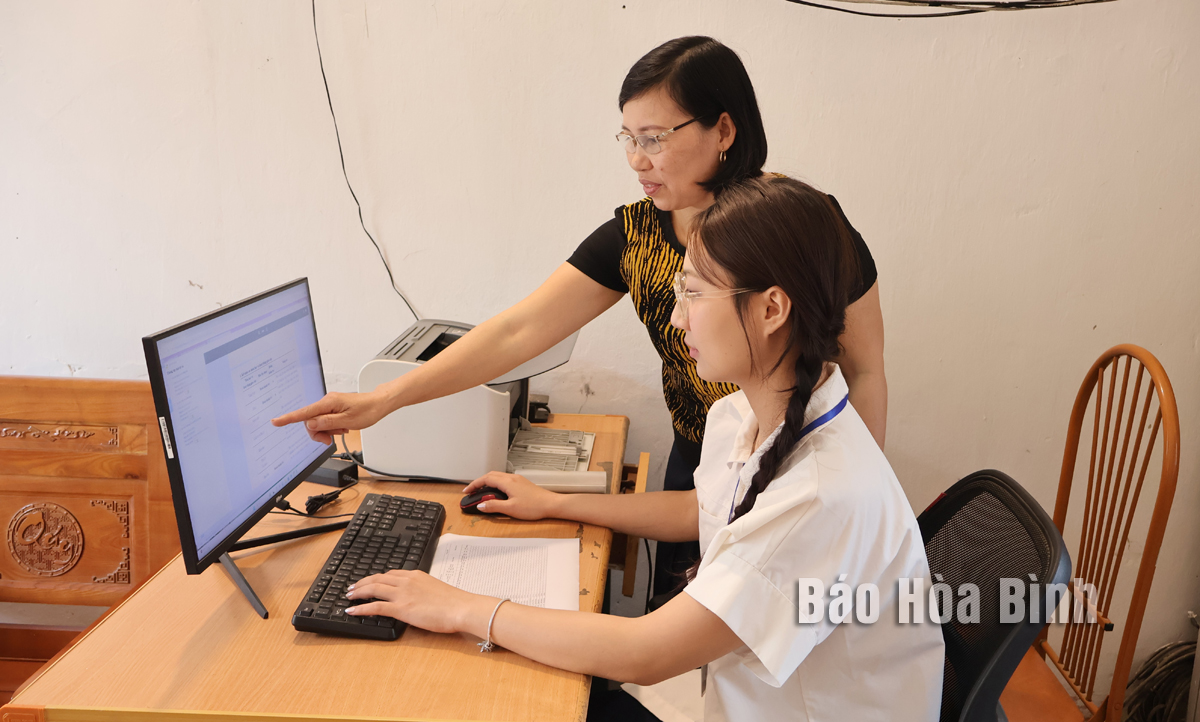
Since the end of 2023-2024 academic year, Cu Yen Primary and Secondary School in Luong Son district has deployed e-study records for all of its 500 primary students, said the school principal Nguyen Thi Tuyen.
Teachers at Cu Yen Primary and Secondary School check data of students on e-studying records.
Tuyen said that the school have a total of 28 classes with 933 students, including 500 primary ones. The e-study records not only reduce the administrative work for teachers but also ensure transparency and accuracy in managing students’ learning results, Tuyen said, adding that to facilitate the digitalisation, the school organised training for teachers.
Implementing e-study records in primary schools is a significant breakthrough in the digital transformation efforts of the provincial Department of Education and Training. Hoa Binh province currently has 63,930 primary school students, with 99.34% using e-study records.
Additionally, the provincial education sector has effectively instructed students to register for university and college admissions through the public service portal. In 2023 and 2024, all local candidates for university and college admissions registered via this portal.
Moreover, the sector is focusing on implementing cashless tuition fee collection. In the second semester of the 2023-2024 school year, the provincial education department collaborated with relevant stakeholders to pilot a payment platform. Parents can pay tuition fees via the SESAP app installed on their smartphones. For those without smartphones, they will receive a QR code for cashless payment through a third party. As of December 2024, total cashless tuition and fee collections across the province reached about 83.7 billion VND (3.22 million USD).
The education and training department has also collaborated with the Department of Digital Authentication and Information Security and the Government Cipher Committee to issue digital signatures for organisations, individuals, and staff across the province. Currently, all 520 public educational institutions and 18,073 of 19,002 individuals including managers, teachers, and staff working in public educational facilities have been issued digital signatures. The remaining individuals are in the process of requesting additional signatures. All two private schools in the province and 535 individuals working in the schools are utilising digital signatures from Vietnam Post and Telecommunications Group (VNPT) and Viettel.
Nguyen Quang Minh, Deputy Director of the department that to enhance digital transformation, the department has intensified the application of information technology in teaching and learning. It has provided training to teacher from preschool to high schools. The department is currently collaborating with Panasonic Vietnam to implement a programme to support STEM education activities. It also partners with the Vietnam STEM Alliance and various non-Governmental organisations to boost STEM (science, technology, engineering and mathematics) initiatives in schools, particularly through the use of AI, robotics, and virtual reality to support teaching and learning.
The province has established over 200 programming and STEM clubs. The clubs have operated effectively, with projects winning awards in national and international science competitions. The department has also worked with telecommunications companies to provide broadband internet access to 98.72% of educational institutions; the remaining facilities are using 3G or 4G due to insufficient cable infrastructure.
Since 2022, the Thien Tam Fund and VinGroup have supported the establishment of 16 computer labs with 313 computers, totaling 3.7 billion VND in the province. The Dariu Foundation has lended 465 laptops and 975 smartphones to support computer science education, along with funding for microcontroller and sensor devices to assist programming and STEM clubs. This has led to a significant positive shift in the digital transformation efforts of the education sector.
The Ho Chi Minh Communist Youth Union of Hoa Binh province officially launched its 2025 Summer Youth Volunteer Campaign on May 24 at Mai Chau High School, introducing a range of activities aimed at supporting disadvantaged communities, ethnic minorities, and remote areas.
For many poor and near-poor households, access to even modest loans once seemed unattainable. Yet, under the Party’s policy "leaving no one behind,” social policy credit has emerged as a crucial support mechanism—empowering tens of thousands in Hoa Binh. The farmers’ associations at all levels have played a key role as reliable intermediaries, delivering capital to communities and helping transform hopes into tangible success.
In late March, 29 labourers from Da Bac district were sent to work as seasonal farm workers in Buyeo county, Chungcheongnam province, the Republic of Korea (RoK). Upon arrival, they quickly settled into their jobs, enjoying good working conditions and benefits, with wages aligned with the terms of their signed contracts. The programme is now being expanded, with relevant departments and sectors actively seeking additional seasonal employment opportunities in various localities across the RoK.
Luong Son Industrial Park has invested in standardised wastewater and emissions treatment systems, enforced tight emission controls, reduced noise, dust, and solid waste, and expanded green spaces, contributing to protecting the environment and promoting sustainable development.
Hoa Binh police are collecting public feedback on amendments to the 2013 Constitution via the national identification app VNeID. This innovative approach marks a giant leap towards modernising grassroots democracy and enhancing transparency in public consultation.
A total public investment capital of 113 billion VND (over 4.3 million USD) was disbursed for a project to upgrade infrastructure and stabilise residents in the vicinity of the Da River reservoir between 2021 and the first quarter of 2025, giving a facelift to local rural areas and improving the quality of people's life.



